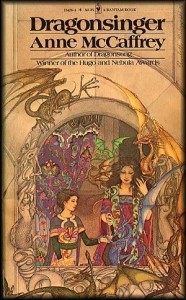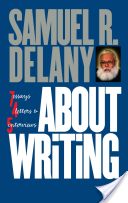
 One of the things I’ve been trying to do in recent years is look more at the history of the field. In the thrift store, I love finding F&SF anthologies from the 60s and 70s, in part because it’s interesting to see which names kept on going, which faded away. Often the most riveting story in a collection is from a writer whose name I’ll only see that once. In reading anthologies, I find that often one of the most revelatory parts is the introduction, less for anything said about the stories than for clues to the publishing climate at the time.
One of the things I’ve been trying to do in recent years is look more at the history of the field. In the thrift store, I love finding F&SF anthologies from the 60s and 70s, in part because it’s interesting to see which names kept on going, which faded away. Often the most riveting story in a collection is from a writer whose name I’ll only see that once. In reading anthologies, I find that often one of the most revelatory parts is the introduction, less for anything said about the stories than for clues to the publishing climate at the time.
Recently in the thrift shop, I picked up a couple of paperbacks: two volumes worth of early Hugo winners, edited by Isaac Asimov. Of course I bought them. How could I not, in light of recent controversies? They’ve been an interesting read – particularly when I’m reading the first Nebula volume at the same time — and sometimes illuminating. If you’d like to read the book I pulled these from, it is More Stories From the Hugo Winners Vol II, published in 1971.
I certainly have realized that despite my admiration for Asimov’s work, the good doctor and I would probably have not gotten along particularly well — at least from my point of view. Every intro to a story seems much more about Asimov than either story or writer, in an egocentric way that seems a little charming but I’m betting was pretty grating to be around at times. (I by no means claim that Asimov is the only SF writer to exhibit this trait.) But Mr. Asimov is not here to defend himself and was very much a product of his time, so I’ll leave it at that.
Because I found it striking, this is taken from his introduction to Anne McCaffrey’s “Weyr Search”. It’s a glimpse into the social mores of that time (the early 70s) that’s interesting. I have refrained from adding any inline commentary. As you read, you may admire my restraint in that.
...

What: The story is told by Charlie Gordon and involves intelligence experiments being done on both Gordon and the title character Algernon, who is a white mouse.
Who: Anyone who wants to be decently well read in science fiction should read this book. It’s a classic, and one referenced and discussed elsewhere. One of my favorite stories by Susan Palwick, the title story in The Fate of Mice, is told from Algernon’s POV.
Why: Read it because you will want to know Charlie, to hear him tell his story, and to see a master use the device of an unreliable narrator in a way that takes your heart and breaks it over the book’s knee. Read it to discover a story that has survived the test of time and will, I strongly believe, continue to do so.
When: Read this when you’re thinking about things like how a character gets the reader on their side, as well as how what a character doesn’t say is sometimes as telling as what they do. Read this when you are ready to sit down and read it in one full sitting, preferably, which is doable for faster readers since it’s a slender book.
Where and how: Read it where you won’t mind weeping; public spaces (like airplanes) are unsuitable because you will have to have a heart as hard as winter to not tear up some. This is, in fact, one of the best examples of a fabulous tearjerker of a story that I know.
#mc_embed_signup{background:#fff; clear:left; font:14px Helvetica,Arial,sans-serif; }
/* Add your own MailChimp form style overrides in your site stylesheet or in this style block.
We recommend moving this block and the preceding CSS link to the HEAD of your HTML file. */
#sfwapro
...

What: About Writing, by Samuel R. Delany, is a book of writing advice that includes seven essays, four letters, and five interviews. Two essays are ones I go back to over and over again, “Thickening the Plot,” and “Characters.”
Who: People who will enjoy this book include all manner of writers, as well as anyone interested in Delany’s own awesome fiction.
When: You should read this when you’re feeling uninspired about your own writing or if you want some assurance that “writing to discover” is as valid an approach as plotting things out thoroughly.
Why: Delany is one of the foremost SF writers of our time. His work speaks not just to those beginning to write, but those well along their path. If, like me, you love his fiction, you’ll find About Writing sheds new light on those works.
Where and how: Read it someplace quiet, where you have space to stare off into the distance, thinking about what Delany has said. Read it straight through or else do what I do and dip in at various places. No matter what angle your approach takes, it’ll be rewarding.
...
This is a Wonder Woman comic written by Samuel R. Delany. Samuel fricking Delany. In issues 202-203 she abandons her super powers and becomes a super agent. Note the label “The Women’s Lib Issue”. So full of AWESOME I’m surprised it could be scanned without shattering the lenses of every piece of A/V equipment in a five block radius.

...
Want access to a lively community of writers and readers, free writing classes, co-working sessions, special speakers, weekly writing games, random pictures and MORE for as little as $2? Check out Cat’s Patreon campaign.

"(On the writing F&SF workshop) Wanted to crow and say thanks: the first story I wrote after taking your class was my very first sale. Coincidence? nah….thanks so much."